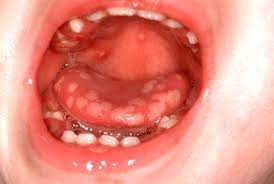Preventing and Managing Herpetic Gingivitis
Herpetic gingivitis is a common viral infection that affects the gums and mouth. It is caused by the herpes simplex virus (HSV) and can lead to painful sores, inflammation, and discomfort. In this article, we will discuss the steps to prevent herpetic gingivitis and provide guidance on home care during treatment under the supervision of a dermatologist.
Dr.Sujith Karimbil
11/12/20232 min read


Herpetic gingivitis is a common viral infection that affects the gums and mouth. It is caused by the herpes simplex virus (HSV) and can lead to painful sores, inflammation, and discomfort. In this article, we will discuss the steps to prevent herpetic gingivitis and provide guidance on home care during treatment under the supervision of a dermatologist.
Preventing Herpetic Gingivitis
While herpetic gingivitis is highly contagious and can be challenging to prevent entirely, there are steps you can take to minimize the risk of infection:
Maintain good oral hygiene by brushing your teeth at least twice a day and flossing daily. This helps remove plaque and bacteria from the mouth, reducing the chances of infection.
Avoid close contact with individuals who have active herpetic lesions or cold sores. Direct contact with these sores can transmit the virus and increase the risk of developing herpetic gingivitis.
Avoid sharing personal items such as toothbrushes, towels, or utensils with infected individuals. This can also help prevent the spread of the herpes simplex virus.
Abstain from oral sex. Herpes simplex virus type 1 (HSV-1) can be transmitted through oral-genital contact, leading to herpetic gingivitis.
Home Care During Treatment
If you are undergoing treatment for herpetic gingivitis under the guidance of a dermatologist, it is essential to follow these home care tips:
Keep the affected area clean by gently rinsing your mouth with warm saltwater. This can help reduce inflammation and promote healing.
Avoid spicy, acidic, or hot foods that can irritate the sores and worsen the symptoms. Opt for soft, bland foods that are easier to chew and swallow.
Apply a cold compress or ice pack to the affected area to alleviate pain and reduce swelling. Be sure to wrap the ice pack in a cloth to protect your skin.
Take over-the-counter pain relievers like acetaminophen or ibuprofen to manage pain and discomfort. Follow the dosage instructions provided by your dermatologist.
Avoid picking or popping the sores, as this can lead to further infection and delay the healing process.
Herpetic gingivitis can be a painful and uncomfortable condition, but with proper prevention and home care, you can manage the symptoms effectively. Remember to maintain good oral hygiene, avoid close contact with infected individuals, and follow the home care tips provided by your dermatologist. If you experience severe symptoms or the condition worsens, consult your dermatologist for further evaluation and treatment.
